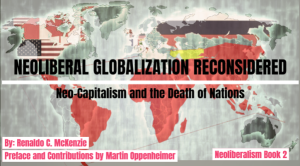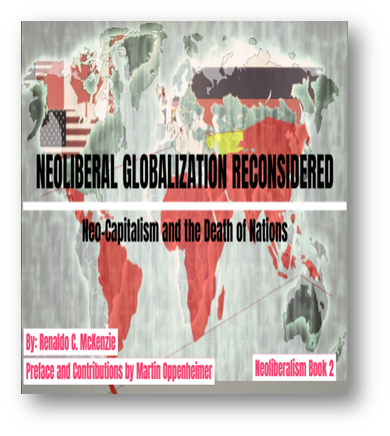A Brief Look Inside:
Neoliberal Globalization Reconsidered: Neo-Capitalism and the Death of Nations
A “Novel” Text
By: Renaldo McKenzie
Foreword and some contributions by: Martin Oppenheimer
Published by: THE NEOLIBERAL CORPORATION
Book 2 of the “Neoliberalism” Book Series

I dedicate this book…
… to my Dad, Rev. Lurkenum L. McKenzie, who was given at first a basic education up to the 9th grade, where he could and needed only to barely read, write, or spell. Yet, his expectations were great: to become an adult, raise a family while working in an industry requiring basic education, and get base pay. But, through trial and error, he fathered six successful children who have written books, completed academic studies at the highest and most prestigious levels, and are extending the limits of what would have been a limited legacy. The cycle would continue, but some slip through the cracks, now working to make it better for those coming behind until there is nothing to hold us back.
CONTENTS
FOREWORD: On Neo-Capitalism by Martin Oppenheimer. 9
Revisiting “Neoliberalism” and the Working Class within The New Capitalism… 36
Differentiating Between Neoliberalism and Neo-Capitalism:. 40
What’s the Difference between Neoliberalism and Liberalism?. 44
Distinguishing Neo-Capitalism, Neoliberalism, and Pseudo-Communism… 48
Neo-Capitalism vs. Neoliberalism… 49
The Dichotomy of Economic Systems: Navigating Between Responsible Socialism and Pseudo-Communism… 50
Dominant Class in Capitalist Societies. 52
Neoliberal Globalization: Crisis as Strategy. 53
The Global Neoliberal Framework and the Necessity for Domestic Social Policy. 71
Responding to Social Inequality: Exploring the Tensions and Dialectics. 89
The Significance of Understanding Social Inequality. 90
Challenging the “One Nation” Illusion.. 90
The Marxist Dialectic: Tension and Revolution.. 91
The Response to Social Inequality: Exploring Revolution.. 91
Historical Responses to Social Inequality: A Journey Through Time. 92
Conclusion: The Ongoing Struggle for Equality. 94
Redistributing Income to The Poor Towards Sustaining Development. 97
The Aim of Social Assistance. 99
Jamaica’s Social and Economic Context. 102
The Effect of Global Recession on Jamaica and the US.. 105
Poverty and Income Inequality in Jamaica. 107
The Comparative Effect of the Global Recession on the US.. 109
The Development of Social Assistance in Jamaica and the US.. 110
The Rationale and Evolutionary Development of PATH… 110
Redistributive Outcomes of PATH and TANF: Benefit Targeting. 114
How does PATH Compare with Other Transfer Programs in Jamaica?. 116
How Does PATH Compare with TANF?. 117
The Effectiveness of PATH and TANF in Targeting the Poor. 118
The Challenge of Social Welfare in a Competitive, Globalized World.. 120
The Need for a Workable and Sustainable-Sustainable Development Plan.. 122
Neoliberal Globalization as Strategy and The Black Position.. 128
Neoliberal Globalization’s Strategy of Control 142
“Haiti: Struggles for Sovereignty and the Challenge of International Intervention”.. 145
“Challenging the Narrative of Haitian Independence”.. 145
“The Contemporary Dilemma: International Intervention and Haiti’s Sovereignty”.. 146
“Navigating International Influence and Haitian Autonomy”.. 153
Empowering Caribbean Voices: A Petition for Haitian Democracy. 154
The Petition for a Haitian-Led Solution:. 156
Unpaid Freedom: Black Histories, Neoliberal Globalization, and the Persistence of Inequality. 160
Unmasking Neoliberal Globalization’s Impact on the Black Position.. 165
The Caribbean’s Place in the Black Position and Neoliberal Globalization. 170
The Caribbean as Part of the Black Position.. 174
— What is Caribbean Thought, and Who Determines this?. 174
What is the Caribbean Thought? Past influences on the Present?. 176
Why “who determines this?” and why is it essential for us to “revisit the past?”. 180
How far must we go to study the Caribbean and why?. 185
Have We Misunderstood Our History?. 190
The Small Group Discussion Dialogue: Have we Misunderstood our Heritage?. 191
What Opportunities Are There to Reinvent the Caribbean?. 199
Are the “White-Collar Crimes” a result of Colonization?. 204
How does Pan-Africanism define Caribbean Thought?. 209
“Black and Brown Peoples” Should Not be rich.” The Other People Should Be!. 211
Transforming Dynamics of Work in Post-Industrial Capitalist Societies. 218
Examining Post-Industrial and Capitalist Societies. 218
Analysis of Braverman and Edward.. 222
Chapter Highlights and key Points. 232
Analysis of Braverman and Edwards. 234
The Changing Dynamics of Work in the Age of Neoliberal Globalization and Neo-Capitalism… 237
Does St. Louis and other Major US Cities Suffer from Relative Deprivation?. 258
A Reckoning with Neoliberal Globalization and Its Consequences. 264
Wealth Growth and Economic Context. 267
Economic Perspectives and Political Choices. 268
Unemployment Realities and Inflation Figures. 268
Political Divides and Fiscal Responsibility. 269
Wealth-to-GDP Ratio and Economic Shifts. 270
Factors Driving Wealth Growth.. 271
Concerns and Implications. 271
Revisiting the Limitations and Opportunities of Black Resistance. 275
Reviewing the Background and Causes of the Global Justice Movement. 278
Is this then the New Atlantis?. 287
The History and Development of the Global Justice Movement. 290
Will The Global Justice Movement Succeed?. 298
Corruption in the Black Lives Matter Movement. 303
International Law, Politics, Sovereignty, Duplicity, and Conflicts. 315
A True Story in Prose to Ponder: An Eye for an Eye. 319
The Limitations of Labor and the Power of Global Capital 324
The Uncertain Future of Socialism and Capitalism… 334
The Power of Social Media: A Potential Game Changer for Social Movements. 345
The Rise of Social Media, Opportunity for Social Movements. 347
Communication is to make Popular, what was the Monopoly. 356
“Who Rules the World?” Power Poses Problems for Progress. 362
What is True of Putin and Russia is also True of all Former Colonial Masters. 364
Putin’s Assertive Ideology. 364
The Contradictions in Putin’s Stance. 373
Challenges to Humanity: China, Cryptocurrency, Russia, and Artificial Intelligence. 376
How is AI different from Machine Learning?. 383
What is the current state of affairs?. 383
Immigration and Global Economic Inequality. 397
If the fallen can perceive of anything better, what will upend violence?. 408
What are the most effective ways to promote human rights in countries with weak governance?”. 414
What is The Ultimate of All Things?. 416
EPILOGUE: THE FINAL DIALOGUE.. 419
Black Scholars Re-Imagination and Re-Invention of the Black Slave in History. 423
The Dialogue on “Price for Her Pound of Flesh”:. 424
The Re-Imagined Slave in Warren’s, “Slavery and Colonization in Early America”. 429
FOREWORD: On Neo-Capitalism by Martin Oppenheimer

Author’s Note: I invited my Mentor, advisor, and former Professor at Penn to provide a Foreword. He struggled initially but decided to submit this on Neo-Capitalism after several intense and ongoing discussions about the new Capitalism, Neo-Capitalism, which we discussed later in this book in dialogue style. Martin provided a terse but scholarly Foreword below:
Renaldo: Martin, what is the new Capitalism, Neo-Capitalism?
Martin: I am pleased to provide the foreword for this thought-provoking and timely exploration of Neo-Capitalism. This book, crafted by the insightful mind of Renaldo McKenzie, delves into the heart of a global economic paradigm that is shaping our world in profound ways. As I embark on this endeavor to introduce Renaldo’s work, it is essential to highlight the significance of Neo-Capitalism as a subject of critical analysis.
The essence of Neo-Capitalism, or what is sometimes called Global Capitalism, lies in its departure from earlier economic epochs, particularly Monopoly Capitalism. In this earlier stage, the world was neatly divided into “core” nations, specializing in manufacturing, and “peripheral” nations, often relegated to producing raw materials for export to the core nations. These relationships of dominance and exploitation, which took root during the colonial era, became defining features of the global economic landscape.
However, Neo-Capitalism has ushered in a new era, rendering those old distinctions obsolete. The mobility of manufacturing across borders, facilitated by the emergence of a global financial market, has shattered the barriers that once separated national economies. This seismic shift in the economic terrain has fundamentally transformed the nature of global interdependence, providing capital with unprecedented mobility while weakening labor’s bargaining power in core sectors, thus making labor markets more malleable.
Embedded within Neo-Capitalism is the ideological framework of Neo-liberalism. It is vital to clarify that the term “liberal” may be misleading, particularly for Americans who often associate liberalism with civil liberties and social reform, such as the New Deal reforms of the past. Neo-liberalism, in contrast, harkens back to the 18th and 19th centuries, encapsulating the idea of capitalism free from government regulation and interference. It champions a laissez-faire approach, advocating for minimal regulation to keep the gears of global capital turning while ensuring that social reforms do not fundamentally impede profitability.
Yet, the impacts of Neo-Capitalism are unique across all nations. The Global South, with its historical legacy of colonialism and subsequent neo-colonialism, continues to grapple with the enduring consequences of this history. These legacies have hindered the Global South’s and black and brown people’s ability to “catch up” and have rendered labor in these regions particularly vulnerable to fluctuations in global market conditions.
The pages of this book also explore the interplay between Neo-Capitalism and Keynesianism, an economic doctrine born out of the New Deal interventions to avert economic depressions. These interventions, aimed at ensuring financial stability, often involved significant government spending. It is worth noting that this policy approach has been somewhat sustained, with military expenditures taking precedence in recent times, underscoring the interconnectedness of economics and politics.
Furthermore, Neo-Capitalism’s unchecked pursuit of profit has contributed to the impending climate catastrophe. As a result, this has galvanized mass movements and ignited the realization among some segments of the capitalist class that corrective measures are imperative. These shifts in consciousness have opened up new avenues for profit within environmentally friendly industries, thereby giving rise to conflicts within the capitalist sphere. These conflicts manifest in the political arena, with differing attitudes toward environmental regulations and sustainable practices.
In this context, mass movements advocating for environmental sustainability are not monolithic; some demands are amenable to co-optation because they align with marketable objectives. The confluence of capitalism and green trends generates tension, mainly when environmental advocates contend that capitalism’s inherent profit-driven dynamic impedes substantive climate crisis resolution. They argue that governments can successfully confront and reverse the processes driving global warming by divesting profit from the system.
Before concluding, it is essential to address a point of contention regarding the work of G. William Domhoff, whose research illuminates the mechanisms of power in the United States. While there may be differences in our perspectives on political strategy, it is crucial to emphasize that disagreement does not signify an opposition to change. Like C. Wright Mills, Domhoff’s work has been instrumental in our understanding of power dynamics. I have playfully referred to him as a “closet Marxist,” although he contests this characterization.
In closing, Renaldo McKenzie’s book stands as a testament to the importance of grappling with the complexities of Neo-Capitalism and its multifaceted impacts on our world. His previous work, “Neoliberalism, Globalization, Income Inequality, Poverty and Resistance,” provided a focused examination of these issues through the lens of Jamaica. This latest endeavor extends the analysis, offering a global perspective that is both enlightening and thought-provoking.
As we delve into the pages of this book, let us embark on a journey of exploration and discovery, armed with the knowledge that critical analysis and discourse are essential tools in navigating the ever-changing landscape of Neo-Capitalism. Renaldo’s work is a testament to the power of scholarship in fostering understanding and informed dialogue and ultimately paving the way for a more just and equitable world.
— Martin Oppenheimer

Neoliberal Globalization Reconsidered, is the second book in the Neoliberalism book series by Renaldo McKenzie. The book will be published by The NeoLiberal Globalization with print and distribution partners Ingram Spark. The book will be published in February marking Black History month. You will be able to preorder the book on February 1, 2024. The book will be available at The NeoLiberal Bookshop and at Amazon, Barnes and Noble etc. The book will be available in all formats, hard cover, paperback and eBook, as well as the audible.
Stay updated, join our mailing list, send us a message, follow us on social media and subscribe to our YouTube channel, The NeoLiberal Round and Podcast, The NeoLiberal Round Podcast on any stream.
You may donate to us via our podcast support page at https://anchor.fm/theneoliberal/support.

The NeoLiberal Corporation, Https://theneoliberal.com
Serving the world today, to solve tomorrow’s challenges, by making popular what was the monopoly.


Simply wish to say your article is as amazing The clearness in your post is just nice and i could assume youre an expert on this subject Well with your permission let me to grab your feed to keep updated with forthcoming post Thanks a million and please carry on the gratifying work
Thank you for your feedback and continue to follow, share our stories and contribute yours as well. We will publish this in a textbook this year. Stay tuned.
If you are trying to message us, you can do so via or social media: twitter: renaldomckenzie or theneoliberalco and facebook: renaldo.mckenzie or the neoliberl corporation.
Email us at [email protected].
You can subscribe at https://youtube.com/@renldomckenzie or podcast: https://anchor.fm/theneoliberal
Thanks I have just been looking for information about this subject for a long time and yours is the best Ive discovered till now However what in regards to the bottom line Are you certain in regards to the supply
Thank you for your feedback and continue to follow, share our stories and contribute yours as well. We will publish this text this year. Keep following us for the announcement.
If you are trying to message us, you can do so via or social media: twitter: renaldomckenzie or theneoliberalco and facebook: renaldo.mckenzie or the neoliberl corporation.
Email us at [email protected].
You can subscribe at https://youtube.com/@renldomckenzie or podcast: https://anchor.fm/theneoliberal